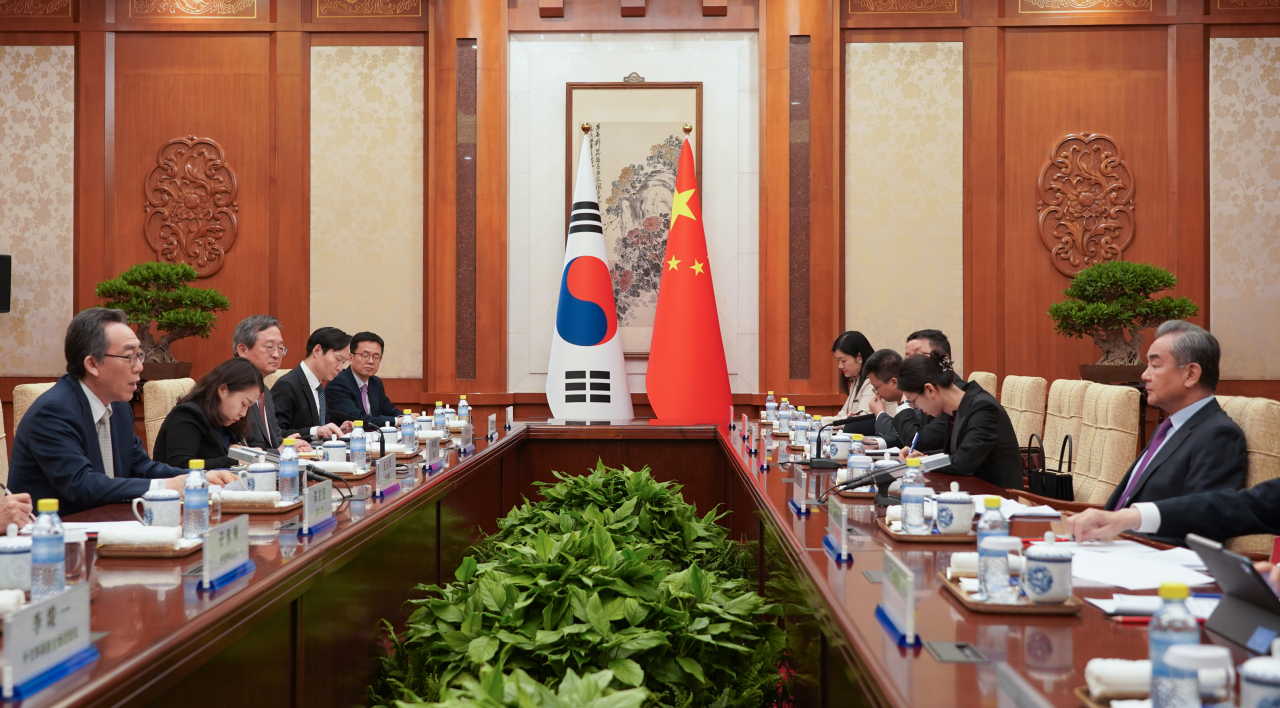 |
Foreign Minister Cho Tae-yul (left) and Chinese Foreign Minister Wang Yi (right) hold bilateral talks on Monday at the Diaoyutai State Guesthouse in Beijing. (Yonhap) |
Chinese Foreign Minister Wang Yi expressed hope Monday that bilateral relations with South Korea will develop further "without interference," saying the current difficulties in the ties do not serve the common interest of the two countries.
Wang made the remarks at the beginning of talks with his South Korean counterpart, Cho Tae-yul, in Beijing, apparently referring to the incidents that sent the bilateral ties to a low point, such as the comments by President Yoon Suk Yeol about maintaining the status quo in the Taiwan Strait that angered Beijing for what it called Seoul's "meddling in" its internal affair.
"The difficulties and challenges facing South Korea-China relations have clearly increased. This is not in line with the mutual interests of our two countries, and nor is it something that China desires," Wang said in the opening remarks through an interpreter.
"I hope that we join our forces to push for a stable and healthy development of the China-South Korea relationship, as South Korea, together with China, sticks to the direction of mutual goodwill ... and uphold the goal of mutual cooperation and face each other, while excluding interference," Wang said.
Monday's talks came as South Korea seeks to manage its relationship with China that has cooled amid its close alignment with the United States.
Cho arrived in Beijing earlier in the day, in the first trip to the Chinese capital by a South Korean foreign minister in more than six years.
The deterioration in the bilateral ties was also evident last year when Chinese Ambassador to Seoul Xing Haiming publicly warned his host country that it would "definitely regret it" if it "bets on China's defeat" in its rivalry with the U.S.
South Korea has been looking to improve ties with China, its largest trading partner and a key player in nuclear diplomacy with North Korea.
At the talks, Cho pointed out that South Korea's relations with China and its relations with the U.S. are not a "zero-sum" relationship, meaning that aligning closely with one country does not mean drifting away from the other.
"We don't perceive foreign relations as a zero-sum relationship, nor do we manage them as such," Cho said at the start of the talks.
"I believe it's important that not one side, but both sides, make efforts to carefully manage ties in a way that disagreements will not turn into conflicts for the development of bilateral relations," he said.
Substantializing the future direction of bilateral relations and building bilateral trust is the main purpose of his visit to Beijing, Cho said, expressing hope that the visit will be the "first step toward untangling the threads" between the two countries and "opening up a new avenue for cooperation."
Following the talks, Wang hosted a dinner banquet for Cho and his delegation, according to sources familiar with the matter.
During the talks, the two sides also likely discussed a trilateral summit with Japan that is most likely to take place in Seoul at the end of May.
Ahead of his departure in Seoul, Cho said he will discuss with Wang various issues of mutual concern, including China's forced repatriation of North Korean defectors and the growing military cooperation between North Korea and Russia, among others.
Earlier in the day, Cho had a meeting with South Korean businesspeople working in China. On Tuesday, Cho will convene a conference of South Korean consuls general in China and discuss municipal-level exchanges.
Cho's two-day trip to Beijing marks the first such visit to the Chinese capital by a South Korean foreign minister since November 2017, when then Foreign Minister Kang Kyung-wha paid a visit during the previous Moon Jae-in government.
The last bilateral talks between the two countries' top diplomats took place in August 2022, between Wang and then Foreign Minister Park Jin, in China's port city of Qingdao in the eastern Shandong Province.







![[Today’s K-pop] Blackpink’s Jennie, Lisa invited to Coachella as solo acts](http://res.heraldm.com/phpwas/restmb_idxmake.php?idx=644&simg=/content/image/2024/11/21/20241121050099_0.jpg)